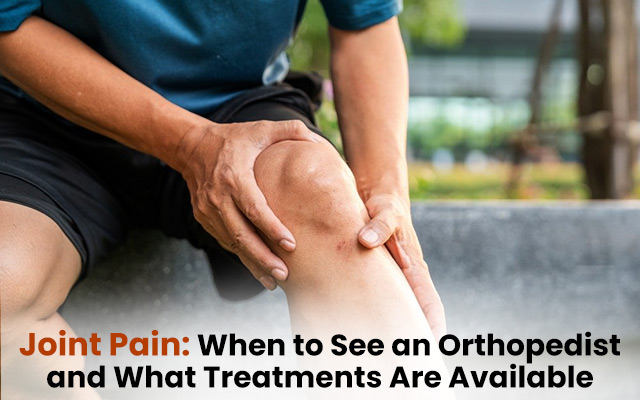Is severe knee pain taking away your peace and leaving you stressed?
It could be a sign of something serious you’ve been ignoring for too long. If you take the right step at the right time, you can get back to your normal life.
But for that, you need a basic understanding of the possible causes — and when it’s time to seek treatment.
In this blog, we’ll discuss all these details in simple terms.
Understanding Joint Pain
Joints are where two bones meet. They let us move, bend, twist, and stay flexible. When joints hurt, it’s often due to inflammation, wear and tear, or injury.
Some cases of joint pain resolve on their own. But in many cases, it needs medical support. Identifying the type and cause of pain helps ensure the right treatment is received at the right time.
Common Causes of Joint Pain
- Osteoarthritis – caused by wear and tear over time
- Rheumatoid arthritis – an autoimmune disease affecting joints
- Injuries – sprains, fractures, or ligament tears
- Tendonitis – inflammation of tendons
- Gout – uric acid buildup in joints
- Bursitis – fluid buildup in the joint cushions
- Post-surgical stiffness or complications
Pain may come from a single joint or affect multiple areas of the body. It’s important to check how long it lasts and how it changes.
Symptoms Indicating the Need for Medical Attention
You don’t need to wait until you can’t walk. Some signs make it clear you need an orthopedic consultation:
- Ongoing pain that doesn’t improve
- Swelling or puffiness around a joint
- The joint feels warm or red
- Crunching or grinding sounds while moving
- Trouble bending or straightening the joint
- Pain that wakes you up at night
- Joint looking deformed or misaligned
When to Consult an Orthopedic Specialist?
Orthopedic doctors deal with bones, joints, muscles, and ligaments. They help you get the correct diagnosis and plan a customised treatment.
Persistent or Severe Pain
Pain lasting more than 2–3 weeks indicates arthritis or an injury that hasn’t healed. Don’t ignore it or mask it with over-the-counter painkillers for too long.
Swelling, Redness, or Warmth in the Joint
These are signs of inflammation. It could mean infection, gout, or autoimmune disease. A proper diagnosis is crucial to prevent it from worsening.
Limited Range of Motion
If you can’t move your joint the way you used to, something could be wrong inside — cartilage damage or a tear, for example.
Joint Instability or Deformity
A shaky joint may mean ligament damage or muscle imbalance. Visible deformity could mean dislocation or wear-related changes.
Inability to Bear Weight
If standing or walking becomes painful, it’s time to consult an orthopaedic specialist. It might be a fracture, ligament tear, or even bone thinning.
Available Treatment Options
Not all joint pain leads to surgery. Many cases improve with non-surgical care. The goal is to reduce pain, improve function, and slow damage.
Non-Surgical Treatments
Medications
Pain relievers reduce inflammation and make movement easier.
Physical Therapy
Therapists guide you through exercises that strengthen muscles and improve flexibility. It helps relieve pressure on joints.
Braces and Supports
These are used to stabilise joints, protect them during movement, and reduce strain.
Alternative Therapies (Acupuncture, Massage)
These may complement medical care. It helps relax muscles and improve circulation.
Surgical Interventions
If non-surgical options don’t provide relief, surgery may be the next step. It is common for joint damage to become severe, especially in the knees, hips, or shoulders.
Kasturi Medical Centre is a trusted superspecialty hospital in Behala. Doctors here use the advanced treatment options to help you recover at the earliest.
Arthroscopy
A minimally invasive surgery where a camera and tiny tools are inserted into the joint. It helps clean out damaged cartilage, remove loose fragments, and treat inflammation. Recovery time is shorter, and it’s often used for sports injuries or early arthritis.
Joint Replacement Surgery
This is one of the most successful treatments for advanced joint damage. Doctors perform blood or joint fluid tests. These help check for infections, rheumatoid arthritis, or high uric acid.
Knee replacement surgery reduces pain, restores movement, and improves quality of life. It is recommended when pain affects daily activities, such as walking, climbing stairs, or even sleeping.
At Kasturi Medical Centre, our team of experienced orthopedic surgeons specialise in knee replacement procedures. We use advanced implants, precise surgical techniques, and modern post-op care. The process helps you recover faster.
Experience Advanced Joint Relief with Expert Care
The causes of joint pain differ. Some individuals may suffer from it due to an injury, while others may have an underlying medical condition.
Treatments vary on the basis of your health and joint condition. Don’t panic, with a professional’s guidance, you will be able to overcome and get back to your healthy life.
Trusted Joint Care at Kasturi Medical Centre
Choose the best in the city, choose us. At our superspeciality hospital in Behala, you will get the proper guidance.

